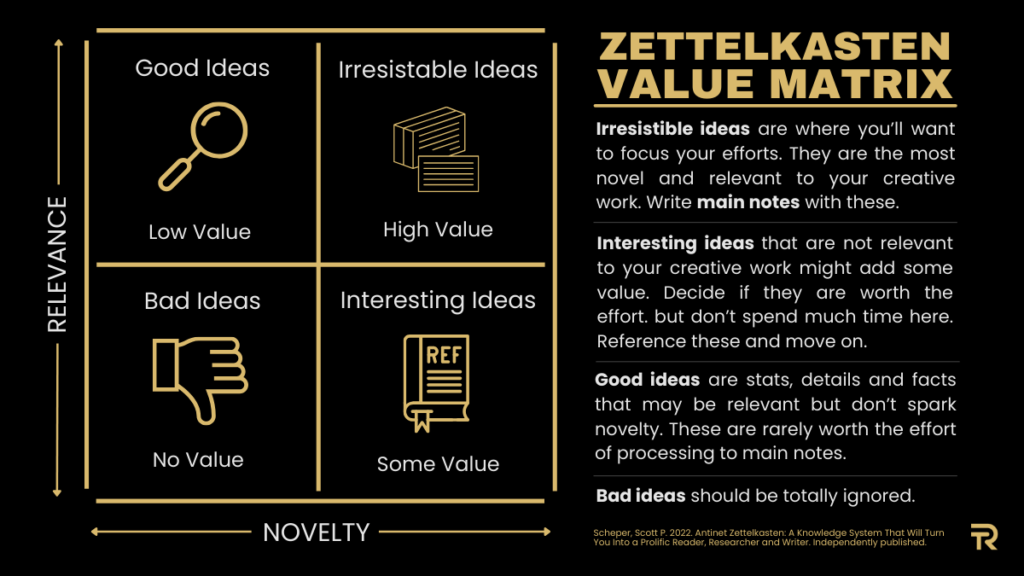The most crucial process of note-making starts before you even write anything. The value of your inputs determines the value of your outputs.
If you’re like me, you may have gotten into note-taking to be more productive. So you fell down the productivity rabbit hole and sought out to build the ultimate productivity system.
The problem is, using digital note-taking apps has become more of a hobby than a tool for generating creative outputs. Constant optimization, tinkering and configuring leads to performative productivity instead of purposeful creation.
Your Obsidian themes and plugins aren’t going to make an impact on anyone, although it might impress Obsidian nerds. If you want to use your system to be productive, you must create.
The primary causes of over-selection comes from over-consumption. Being immersed in the world of information overload with digital tools that can effortlessly capture and sync with your note-taking app, the technology compels you to collect information.
Our brains get tricked into the cycle of FOMO (fear of missing out), thinking it’s better to have the information saved than to not have it. But having a collection of highlights and copy & pasted information is not advancing your learning and in reality, making you less productive.
Selection is a skill that requires discipline and focus to sharpen. Developing the skill of selection is what sets apart information collectors from synthesizers.
Collectors helplessly capture anything that stands out to them. Synthesizers filter the noise by selecting only the most irresistible ideas that can be put to action.
Collectors mistakenly believe the more they collect the more they know. Synthesizers practice mindful capture by having a high criteria for the sources they select.
Collectors take notes to build a personal wikipedia.
Synthesizers write notes to create valuable knowledge artifacts with the intent to publish them as outputs.
So if the value of the notes you create depends on the sources you select, how do you determine what to select and what to exclude?����
You must first establish a selection criteria.
The filtering process all starts with consumption. What you select emerges from what you consume. If your digital content consumption were a diet, would you be eating clean or junk food? If all you are consuming is entertainment and memes, the quality of your selection is limited because this type of content does not provide any transformative value.
The quick capture of digital systems are mistakenly understood as an advantage. As a result of low friction, digital captures lead to a higher quantity of unprocessed notes.
You are then constantly fighting against the tool itself to avoid over-selection, resulting in treadmill of unprocessed notes.
Instead of relying on willpower to avoid over-selection with apps that compel you to collect effortlessly, I suggest trying these 5 criteria to get started.
- Hand write your source notes. This will give you the benefits of the forced constraints of the note card, focus your reading without the presence of a digital device, and reduce the overwhelm of a blank digital note. Plus, studies have shown that writing by hand increases memory retention and focus. Reading with a pen in hand keeps you actively engaged with the knowledge you are consuming.
- Avoid conventional wisdom and best selling books. There are thousands of creators regurgitating the same ideas to the point where it becomes noise. Hunt for rare knowledge from original sources. If you discover an idea you like, pay attention to where it came from. Find out who inspired the person who expressed that idea.
- Collect quotes rarely. Copy & pasting excerpts is collection, not note-making.Never present a quote naked. Add your own commentary and context by introducing the quote. When you come across a quote that jumps out at you, ask yourself the following:
- Am I willing to write this down by hand?
- Can I reformulate this quote into my own words?
- Does this add value to any existing notes?
- Consume actively, not passively. Books with complex knowledge should be at the top of your quality filter since they have more intellectual density that inspire rumination. Listening to people talk on a podcast is passively engaging with simplified knowledge that has already been synthesized. The role of the synthesizer is to simplify complex knowledge then reformulate it back into your own complexity, not to regurgitate ideas that have been synthesized by someone else.
- Use a value matrix as a visualization tool to determine how applicable and novel an idea is. Discerning the value of ideas as you encounter them is a core part of the selection skill. All information is presented to us equally and identifying ideas worth engaging with is a uniquely human ability, relative to each person’s unique interests.

Your selections are the fuel that powers the creative engine that is your zettelkasten. Like any engine, it can’t run on empty; it needs the right fuel to run efficiently.
Develop your own selection criteria. Mine are simply suggestions. Use any or none of them, but it is essential to establish a criteria that increase the quality and decreases the quantity of your selections.
This is what makes note-making a truly enjoyable and rewarding experience.
Value in, value out.